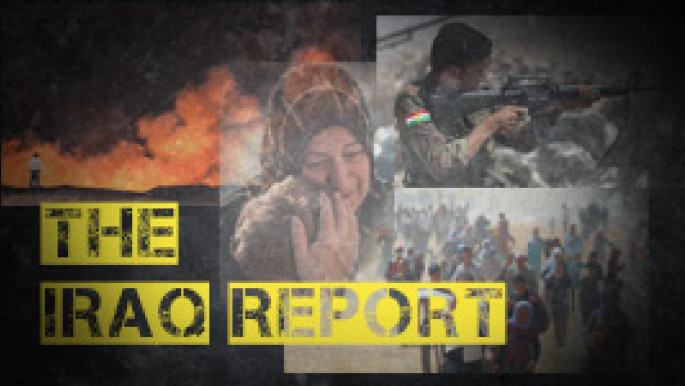Iraq election winner Sadr meets pro-Iran bloc and ex-militia leader Hadi al-Amiri
Iraq election winner Sadr meets pro-Iran bloc and ex-militia leader Hadi al-Amiri
Muqtada al-Sadr, who heads an anti-Iran coalition, met political rival Hadi al-Amiri on Sunday to discuss the formation of the next government.
2 min read
Iraqi Shia cleric Muqtada al-Sadr's Sairoon alliance won the parliamentary elections [Getty]
Iraqi cleric Muqtada al-Sadr whose "Sairoon" bloc won the most seats in the general election, said he hopes to form an inclusive government after meeting with the leader of the pro-Iranian "Conquest Alliance" Hadi al-Amiri on Sunday.
The political rivals discussed the results of the May 12 elections, the first since the country's defeat of the Islamic State group, which left Prime Minister Haider al-Abadi's "Victory Alliance" in third place.
"The process of government formation must be a national decision and importantly, must include the participation of all the winning blocs," a statement from Sadr's office said.
While Sadr will have a strong say in negotiations to form the next government, he cannot become prime minister because he did not run in the election.
Sadr - the former leader of the anti-Western Mahdi Army during the US occupation - ran on a campaign promising to stamp out corruption but has also been keen to distance himself from Iranian influence.
Meanwhile Amiri, who heads an umbrella of Hashed al-Shaabi paramilitary groups, has maintained close ties with Iran for decades.
Before the election, Tehran publicly stated it would not allow Sadr's bloc to govern close ally Iraq, with which it shares a border. Iran has influenced the choice for prime minister in the past.
Top Iranian general Qassem Soleimani, who heads the Iranian Revolutionary Guard Corps [IRGC] foreign arm al-Quds Force, was reportedly in Baghdad shortly after the vote to discuss the formation of the new government as Sadr's anti-Iran party stormed ahead in the polls.
The political rivals discussed the results of the May 12 elections, the first since the country's defeat of the Islamic State group, which left Prime Minister Haider al-Abadi's "Victory Alliance" in third place.
"The process of government formation must be a national decision and importantly, must include the participation of all the winning blocs," a statement from Sadr's office said.
While Sadr will have a strong say in negotiations to form the next government, he cannot become prime minister because he did not run in the election.
Sadr - the former leader of the anti-Western Mahdi Army during the US occupation - ran on a campaign promising to stamp out corruption but has also been keen to distance himself from Iranian influence.
Meanwhile Amiri, who heads an umbrella of Hashed al-Shaabi paramilitary groups, has maintained close ties with Iran for decades.
 |
|
| Catch up with our weekly round-up from Iraq |
Top Iranian general Qassem Soleimani, who heads the Iranian Revolutionary Guard Corps [IRGC] foreign arm al-Quds Force, was reportedly in Baghdad shortly after the vote to discuss the formation of the new government as Sadr's anti-Iran party stormed ahead in the polls.
The meeting with Amiri came less than 24 hours after the nationalist cleric met with Abadi, hinting at a possible coalition.
![Sadr [Getty] Sadr [Getty]](/sites/default/files/styles/large_16_9/public/media/images/8AA614A0-B5D6-46F6-9A54-05D7A4D39E91.jpg?h=d1cb525d&itok=HXNPcs8u)

![President Pezeshkian has denounced Israel's attacks on Lebanon [Getty]](/sites/default/files/styles/image_684x385/public/2173482924.jpeg?h=a5f2f23a&itok=q3evVtko)



 Follow the Middle East's top stories in English at The New Arab on Google News
Follow the Middle East's top stories in English at The New Arab on Google News


